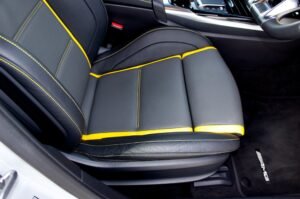Today’s cars are built with numerous safety features to ensure the protection of the driver and the passengers.
If you look at your car’s dashboard, you are going to see several warning lights – low fuel warning, seatbelt warning, battery alert, antilock brake warning, etc. They are primarily meant to let you know if any part of your vehicle needs to be checked.
Aside from those mentioned above, there is also what’s called the low tire pressure light. This informs you that the pressure level in one or more of your tires is low.
However, there are times when the low tire pressure light goes haywire. It is switched on, but all the tires are fine.
This is a very common issue in vehicles with TPMS. In fact, it is dubbed as an inconvenient and annoying problem that some owners install a TPMS Bypass Emulator in their cars.
What Is the TPMS?
The low tire pressure light is part of the car’s tire pressure monitoring system (TPMS). The TPMS is a built-in electronic system meant to monitor the air pressure inside tires.
The TPMS is primarily meant to reduce accidents and increase road safety by keeping you (the driver) informed of the state of your car’s tire pressure.
As you already probably know, having overinflated or underinflated tires is dangerous. This situation does not just affect the performance of your vehicle but also increases your risk of getting embroiled in a car mishap.
Having tire pressure monitors is mandatory for all vehicles in the EU. This law fully took effect in the UK and Ireland in 2015.
Car manufacturers need to comply with this legislation; otherwise, they are going to be penalised. In the UK, non-compliant vehicles automatically fail the Ministry of Transport evaluation. Furthermore, they can’t be sold since they are not going to be released.
Possible Reasons for TPMS Malfunction
Why is it that your low tire pressure light is on even if all your tires are fine? We list down some of the possible reasons below:
Temperature Change
This is the very common reason behind TPMS glitches during the winter season. You see, when the temperature drops significantly, the air pressure in your tire goes down as well.
Why does this happen?
It’s all about how matter reacts to temperature variations. It expands when it’s hot; it compresses when it’s cold.
As a result, even if tires are not underinflated, the TPMS may sense a lower tire pressure which would cause the warning light to turn on. The issue eventually goes away when the tires are warmed.
Damaged or Misaligned Sensor
The glitch in the warning light can also be due to a damaged or knocked off sensor. These things usually happen when the tire is being changed.
Since it is placed on the tire’s rim, the sensor may get broken or knocked off during the replacement process. When this happens, you’d have to take your vehicle back to the automotive shop to be fixed.
Battery Issue
Most sensor batteries have a service life of 6 to 10 years. If the battery charge is already running low, it can cause the TPMS to malfunction.
To be more precise, when the sensor’s battery is weak, it won’t be able to efficiently transmit signal.
Faulty Wiring System
Over time, a car’s wiring system deteriorates as a result of the natural wear and tear process. It can also get damaged when you run over a huge pothole or when you figure in an accident.
The TPMS need these wires to function properly. Hence, when they are no longer in tiptop condition, the performance of the TPMS suffers.
Broken TPMS
Another possible reason is that your device is broken. A telltale sign of a defective TPMS is when the dash light indicator flashes every 60 – 90 seconds after starting the car.
Those mentioned above are just some of the many reasons why the low pressure warning light is on even if your tires are perfectly okay.
Clearly, most of them are not serious issues – not the type that can put you in a precarious situation.
Just a word of caution:
When driving, remember to always be on the side of safety. If you see the low tire pressure light on, the best thing to do is to find a safe place to pull over and check your tires. If you see that the tires are fine, then take your vehicle to a mechanic right away.
Do you want to learn more about the TPMS Bypass Emulator? Call us today on UK: +44(0) 77 837 25020 or IRL: +353(0)83 847 8878!




0 Comments